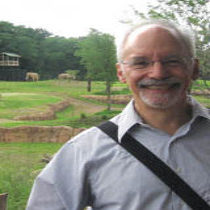Landscape Architecture for Landscape Architects › Forums › SUSTAINABILITY & DESIGN › Is the future really “green”?
- This topic has 1 reply, 12 voices, and was last updated 15 years, 4 months ago by
 Thomas J. Johnson.
Thomas J. Johnson.
-
AuthorPosts
-
October 11, 2010 at 4:58 pm #167455
 Rob HalpernParticipant
Rob HalpernParticipant“Or is fire a natural result of to much fuel?”
By which you mean species… or humans?
At this time, something like 22% of plant species world wide are endangered.
http://www.kew.org/science/plants-at-risk/plants-worldwide.htm
The last time that happened was either the great Ice Age or the event (assuming there was one) that wiped out the dinosaurs.
Except this time it is another species causing it. A unique situationOctober 11, 2010 at 7:01 pm #167454 Steve MercerParticipant
Steve MercerParticipantYes they may very well be endangered… but it is probably due to a combination of factors. Habitat reduction due to Human population… gobal climate change if there is such a thing due to Human intervention or just plain Mother Nature…who knows for sure? But plants and animals have always had an endangered list… always. When worldwide human populations tip the balance to far Mother Nature will be there with stiff course corrections!
October 11, 2010 at 7:34 pm #167453 Rob HalpernParticipant
Rob HalpernParticipantWell, I see your plan now.
As we continue to obliterate Nature, eventually it will come crashing down on us. So it’s all taken care of. No need to be concerned or change our economics or behavior. The remedy is built in.October 11, 2010 at 9:02 pm #167452 Rob HalpernParticipant
Rob HalpernParticipantAnd it is already begun
http://gulfnews.com/news/world/uk/15-000-species-of-medicinal-plants-face-extinction-1.78647October 11, 2010 at 9:51 pm #167451 Steve MercerParticipant
Steve MercerParticipantThe remedy is built in. It is up to each and everyone of us to change it if you do not like the outcome. Though it is difficult to see how any one country can make much of a difference.
October 11, 2010 at 10:00 pm #167450 martyParticipant
martyParticipantThe efficiency of solar panels will continue to improve. Solar companies profitability depends on it. This is still a very young industry. As time goes on and alternative energy becomes more competitive with fossil fuels there will be huge jumps in efficiency of solar electricity and photovoltaic technology in general.
It would be interesting to learn the true net benefit of solar electricity in terms of environmental footprint. You mention that the supply chain for solar is less than green, and thats a good point. But, given the fact that a solar panel will generate clean electricity for 20+ years, doesn’t the green outweigh the bad? I’m sure there are studies that must show this.
As far as mega fields ruining the landscape I’m not too concerned. Most fields will be scattered and smaller because of the fact that so much electricity is lost during transmission. It will be more efficient to locate fields next to their intended users. Take a look at Germany. They are the leaders in solar and a large percentage of their panels are elegantly installed on rooftops.
I’m sure when you compare solar to nuclear and conventional sources of energy solar will come out exponentially ahead in terms of “greenness”. Don’t forget that solar panels can be recycled when they become less efficient.
I would be ok with trying to live without a cell phone, computer, daily automobile use, ps3, internet etc. but I dont think most people are like me. People love that shit. Hopefully solar will be the answer to the part of the energy problem. let me know ur thoughts chupaOctober 11, 2010 at 10:02 pm #167449 martyParticipant
martyParticipantt
October 11, 2010 at 11:57 pm #167448 Steve MercerParticipant
Steve MercerParticipantWell that is all well and good if you live in Arizona or New Mexico. But I live in Kentucky and there are months that go by sometimes in the winter where we may not see the sun but a day or two. I rather doubt solar has much of a future there unless someone comes up with a way to store all that energy through the summer and make it available during the winter. Wind is also not very appealing here because the wind only blows when an occasional weather front comes blowing in. So green will have to come from other sources! Hey I know let’s surround the sun with satilites and collect the energy directly and beam it back to earth via Laser! (Sounds good if you say it real fast… better practice on saying it faster though! 🙂 )
October 12, 2010 at 12:19 am #167447 Andrew Garulay, RLAParticipant
Andrew Garulay, RLAParticipantI have to wonder if using the sun’s energy that is currently going somewhere else is going to effect the climate. I would think it is a drop in the bucket, but if we are indeed headed for impending doom using fossil fuels, it stands to reason that it could have an effect.
October 12, 2010 at 11:57 am #167446 Rob HalpernParticipant
Rob HalpernParticipantAnother article, quite timely:
October 12, 2010 at 12:29 pm #167445 Steve MercerParticipant
Steve MercerParticipantYou assume that Americans wish to live that close to each other. I haven’t seen much evidence of that. with the exceptions of our very largest cities. Most smaller cities have trouble even getting basic commerce in the inner cities i.e. grocery stores. Why because no one chooses to live there. Until Americans change their basic attitudes towards where they live and what constitutes the neighborhoods they live in, Building these types of communities may be a waste of development money. But hey if you have money to burn go for it!
October 12, 2010 at 1:31 pm #167444 Steve MercerParticipant
Steve MercerParticipantI chuckle at the very first issue sited in this article it certainly does not lend much credibility to the rest of the points made in it. The bee population in China was devastated by a trachea mite. It started well over 30 years ago. And the native bee population is still to this day struggling to overcome the problem. And guess what? The same mites have found their way to the US shores. I am sure that bees in China also have issues with pollution as China is a developing nation and they are where we were 40 or 50 years ago (environmentally) but the primary problem with bees is Mother Nature! It makes for good headlines though! Typical of a news agency Leap before you look (report before you check your facts) Here is an articule that is more enlightening: http://www.fas.org/sgp/crs/misc/RL33938.pdf –
October 12, 2010 at 5:52 pm #167443 BoilerplaterParticipant
BoilerplaterParticipantBy “somewhere else” do you mean hitting plant leaves and causing photosynthesis? Might we be displacing enough respirating plant life to have an effect on that cycle? I dunno, out here in the Mojave desert, there isn’t a whole lot of leaf area to remove to start with. Its predominantly creosote bush and coyote brush, spaced far apart. They have tiny leaves. Hardly the lungs of the earth like the Amazon rain forest has been called. A lot of those PV panels will be placed on roofs, where the native landscape has already been displaced. The key is using the type of sustainable energy appropriate to your climate. As another poster alluded, its not so great in cloudy Kentucky. Yet they use a lot of PV in Germany, which isn’t known for having a sunny climate. On my last visit to NJ, I saw more PV than I do out here in Las Vegas. Crazy.
October 12, 2010 at 11:15 pm #167442 Andrew Garulay, RLAParticipant
Andrew Garulay, RLAParticipantI mean that if the energy captured for our use was not captured, it would do something. Whether that means heating the ground or air, reflected, causing wind to blow, …. I don’t know. It is hard for me to fathom the idea that the earth would notice it at all, but with all the stuff you read about the effects of different crop covers it has to be as probable (or improbable).
October 13, 2010 at 12:13 am #167441 Steve MercerParticipant
Steve MercerParticipantI especially like your No. 5.) “Support high density in order to minimize spaces between buildings and make sure architects know that you own the spaces between buildings.” The firefighters (otherwise known as the foundation savers) will like it to because when one building catches on fire they all will catch on fire! Oops! you mean we have to design for that inevitability too? 🙂
-
AuthorPosts
- You must be logged in to reply to this topic.


